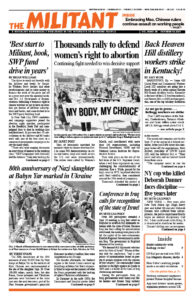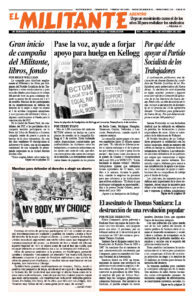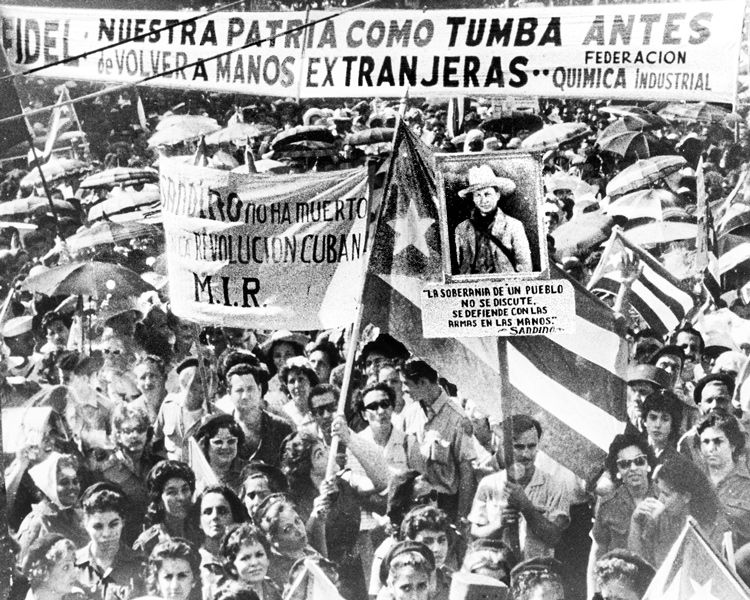Below is an excerpt from a March 26, 1962, speech by Fidel Castro, the central leader of the Cuban Revolution. In it Castro discusses how Cuba’s workers and peasants were won through the series of revolutionary mobilizations and struggles to consciousness they were making a socialist revolution led by a Marxist leadership, as well as willingness to fight to the death to defend it. The speech is entitled “Against Bureaucracy and Sectarianism.” Copyright ©1983 by Pathfinder Press. Reprinted with permission.
BY FIDEL CASTRO
The revolution became a powerful ideological movement. Revolutionary ideas slowly won the masses over. The Cuban people, in great numbers, began to accept revolutionary ideas, to uphold revolutionary ideas. That ardor, that rebelliousness, that sense of indignant protest against tyranny, against abuse, against injustice, was slowly converted into the firm revolutionary consciousness of our people.
Revolutionary ideas did not become the consciousness of a minority, of a group. They became the consciousness of the great masses of our people. Whoever doubts it, let him recall the Declaration of Havana, the Second Declaration of Havana, the presence there of a million Cubans; the enthusiasm with which those one million Cubans supported the revolutionary ideas, radical ideas, truly advanced ideas, contained in that Second Declaration of Havana; the enthusiasm with which they supported them, the evidence of political judgment they displayed as they hailed the value of each sentence.1
What did this show? That the masses had become revolutionary; that the masses had embraced Marxist ideology; that the masses had embraced Marxism-Leninism. That was an unquestionable fact. The camps had been defined; the enemies had declared themselves as such; the laboring masses, the peasant, the student masses, the masses of the poor, the underprivileged masses of our nation, significant portions of the middle class, sections of the petty bourgeoisie, intellectual workers — made Marxist-Leninist ideas their own, made their own the struggle against imperialism, made their own the struggle for the socialist revolution.
That was not the product of a whim; that was not something which was imposed upon the masses. The revolutionary laws themselves, the very accomplishments of the revolution, began to win the masses over to the revolution. They began to convert the masses into revolutionary masses. There were a whole series of accomplishments which began with a series of laws that benefited the people. All the laws benefited: the reduction in telephone rates, the cancellation of the corrupt contracts which the companies had obtained under the protection of the tyranny; the urban reform laws, the rent laws, beginning with the laws reducing rent and then the reduction of the price of building plots, then the urban reform law; then there were the agrarian reform laws; then the laws nationalizing foreign businesses and later the laws nationalizing large businesses. These became milestones marking the course of the revolution, marking the advance of the revolution, of the people.
The people developed rapidly — the people became more revolutionary by the day. When the danger of invasion began to threaten our country, when it even was thought possible that an attack would be made by the powerful forces of imperialism, when we became aware of that danger — because we will have to consider the possibility of such an attack for a long time to come — the people were mobilized.2 They became members of the militia. Thousands upon thousands of young men became antiaircraft artillerymen; thousands upon thousands of workers, of poor people, became antitank gunners and artillerymen of various types; hundreds and thousands of men and women enrolled in the battalions. They enrolled in the combat units and they prepared to fight, if necessary, one of the greatest battles, one of the most heroic which any people could engage in.
This means that our people were prepared to take all the risks, to suffer all the consequences of their revolutionary stand, to oppose imperialism resolutely, without wavering. They were all willing to die, if necessary, in defense of the revolution and in defense of the homeland. Who will deny the enthusiasm with which the masses carried out many tasks, such as volunteering for work? They responded to every call that was made to them, to every mass meeting, to every patriotic gathering, to every revolutionary gathering.
So that when the cowardly attack of April 17 — or of April 15 came, when airplanes, which came from foreign bases attacked various places in our country; when we went to bury those comrades who had died that day, as we had gone before to bury other comrades, as we had done a few months before to bury the victims of the steamer La Coubre,3 other victims of reaction, of imperialism, of the reactionaries, of the exploiters; on the eve of the battle with the imperialists — for it was not done after the battle — the socialist character of the revolution was announced; we proclaimed what was already a fact.
And who can deny it — the overwhelming enthusiasm with which the masses of workers assembled there and formed into militia battalions, raised their rifles and resolved to fight, resolved to give combat? Who can deny the heroism with which the soldiers, members of the militia, men and women, fought? Who can deny the heroism with which the people fought the mercenaries at Playa Girón? Who can deny the self-consciousness, the disregard for their lives, which the men showed when they threw themselves against tanks, against enemy machine guns, as they advanced steadily across open terrain, in the face of danger from enemy bombers, advancing steadily in the face of the enemy’s air attacks, despite casualties and deaths caused in their ranks by the enemy’s aircraft and the enemy’s shells? Who can deny this? A look at the number on the casualty list will suffice to make us understand the enthusiasm and selflessness with which the masses threw themselves into the fight. There they were, filled with enthusiasm, fighting consciously for the socialist revolution.
What does this mean? This means that a great qualitative change had taken place in the masses: they had become revolutionary masses. That is a positive fact, an undeniable fact. Whoever doesn’t see it that way is nearsighted. Whoever doesn’t see it that way is blind. Whoever doesn’t see it that way is simply an idiot.
-
- 1 The First and Second Declarations of Havana were each read to rallies of over one million people on Sept. 2, 1960, and Feb. 4, 1962, respectively. They discussed what the toilers were accomplishing in Cuba and laid out the need for revolution throughout Latin America.
2 Fidel is referring to the U.S.-organized assault at the Bay of Pigs on April 17, 1961, where Cuban forces went into combat against the invaders, soundly defeating them in less that 72 hours.
3 La Coubre, a French merchant ship carrying ammunition from Belgium, was blown up in Havana Harbor March 4, 1960, killing 100 people.


